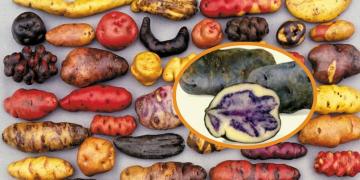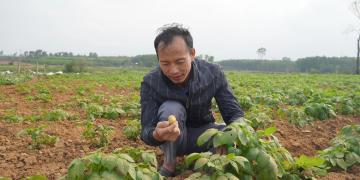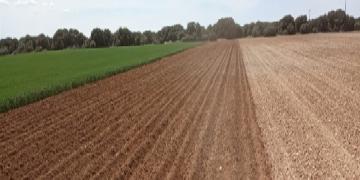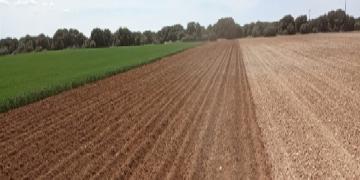UK: Seed potatoes in short supply as Brexit trade challenges continue
For the second consecutive year seed potato availability is an issue for UK potato growers.

Since Brexit, the importation of seed potatoes into the EU from Britain is prohibited by EU plant health regulations.
Before Brexit, significant quantities of seed potatoes had been imported into Ireland from Scotland. With the loss of this source, Irish growers of processing varieties (for chipping and crisping) have found it very difficult to source sufficient seed potatoes for planting in 2025.
Ireland has new support schemes for increasing the area of seed potato production, since Brexit. But, overall, the level of domestic seed production has not increased sufficiently to fill the Brexit supply deficit.
This is one of many areas that the UK and EU are still haggling over. But relations have improved, with the UK’s new Labour government committed to signing a new Sanitary and Phytosanitary agreement with the EU, to ease post-Brexit trading frictions.
Unfortunately, another potato planting season is passing without a breakthrough. And it now seems that Brexit is leaving even UK growers short of seed. For the second consecutive year, availability is an issue for UK potato growers.
This is attributed to lower seed yields in England (which supplies around one third of the seed used for ware production in England and Wales) in both 2023 and 2024, plus increasing demand from overseas (non-EU) markets, and a reduction in the number of growers willing to invest in the riskier seed potato production, opting instead to grow ware crops.
It is thought that many UK seed growers reduced their acreage when seed potatoes could no longer be exported from GB to the EU, once a valuable trade outlet for seed crop surpluses. Also exacerbating seed shortages is the fact that EU seed potatoes can no longer be traded or marketed in the UK.
EU/UK seed potato negotiations
When seed potatoes came up in ongoing EU-UK Brexit talks, the UK restated that resuming this trade remains a UK priority since the end of the Brexit transition period. The UK has welcomed last autumn’s EU audit of UK seed potato production, but the EU said no precise timeline could be given for results of the audit.
UK requests for the EU to allow seed potatoes imported from certain areas in Great Britain, based on meeting relevant EU requirements, have also apparently fallen on deaf ears.
The EU has said access of GB seed potatoes to the EU would require legal amendments introduced through regulatory committees, plus co-decision by the Council of the EU and the European Parliament.
There have also been EU applications for marketing of seed potatoes in GB, but no little response from the UK, at least up to the most recent meeting of EU officials with the UK’s Trade Specialised Committee on Sanitary and Phytosanitary Measures.
However, the UK has clarified that after initial assessment, final decisions for authorisation would need to be taken by the ministers of each devolved UK entity.
Both the UK and EU potato industries are anxious for mutually beneficial compromises between the EU and UK authorities, to restore bilateral trade in seed potatoes.
Other EU/UK negotiations
Many other Brexit issues are being discussed by the EU and the UK, including the GB Border Target Operating Model (BTOM) introduced last year.
The EU has questioned BTOM fees; varying implementation at different border posts; and communications with exporting countries, traders, and transporters. The UK indicated that inspection fees do not exceed the costs incurred to perform the checks.
Regarding risk categories for products of animal origin, the UK has said these will be reviewed every six months.
The EU has suggested that the UK move several fruit and vegetable commodities from a low-risk category to a medium-risk category in early 2024, without notification, followed by an easement, temporarily treating those commodities as low-risk.
The UK clarified that risk categorisation changes for plants can be longer or shorter than the minimum three months foreseen.
There have also been disagreements over the UK prohibiting fresh pigmeat from areas of the EU affected by African swine fever (ASF) in wild boar, but not in domestic pigs. The UK responded that it has a different epidemiological ASF situation, and highlighted the importance of keeping ASF out.
The EU sought an update on the UK’s approval of France’s vaccination plan against bird flu, which effectively results in a prohibition of import of meat of vaccinated poultry from the country since early 2024.
When Labour came to power last July, it committed in its manifesto to negotiating a UK-EU SPS agreement to ease post-Brexit trading frictions by reducing the need for extensive checks and paperwork.
However, aligning with almost all the EU’s food safety rules could constrain the UK’s flexibility in negotiating other free trade agreements.
In January, the UK minister responsible for EU reset negotiations, Nick Thomas-Symonds, said he wanted a “bespoke” SPS. The next major milestone in negotiations is the first post-Brexit UK-EU summit, scheduled for May 19.
While the UK has not proactively diverged from almost any EU food safety rules post-Brexit, it has implemented a ban on live animal exports and moved ahead on gene editing. Specific carve-outs might be needed for these in SPS negotiations with the EU.
Fuente: irishexaminer.com




